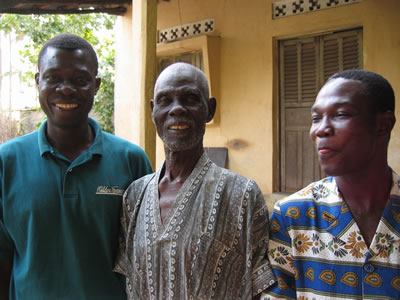
|
|||||||||||||||||||||||||||||||||||
|
Tuesday
December 23 2003 After taking a little stroll in the Kara market, I think that I am starting to get the hang of African markets. It is a rather unremarkable market. One interesting thing was that there seemed to be allot of people selling sandals and shoes. I mean ALOT of people. So, I figured this must mean that people really like buying shoes. Well, when I looked at the ground, I noticed that EVERYBODY simply wears 75 cent flip flops. So, I don't know how these shoe guys get any business. When walking back home, I saw a great reason to cut pork out of any diet. There was a group of about 10 pigs down beside a river, all oinking away with their noses a foot deep into garbage. It was totally disgusting to see how much they were enjoying it.
I once saw cows doing the same thing. I think I may turn vegetarian while in Togo... The north of Togo in which Kara is found is mostly of Muslim influence. There is a specific district in the town that is the Muslim district. The president's palace as well as his party headquarters is both in Kara. They are of course humungous buildings. Just a few kilometres away I visited a small village. There I met a very old man. I asked him how old he was, at which point he had to stop and think about it for a while, after which he came to the conclusion that he was 105 years old. It is not uncommon to find these very old people out in small villages. In Africa they say that when an old person dies, it is a library that burns down.
In this little village, things change from city to a village with round little mud huts everywhere. These mud huts are actually relatively cool temperature wise, as compared to the cement housing with tin roofs that seem to just radiate the heat into the house even stronger. These mud hut villages illustrate how quickly a community can change over very short geographical distances. Very important to note, is that unlike say, they Mennonite people who choose a more traditional lifestyle, these people have no choice. They live in mud because that's all that they can afford. I kind of always had in my mind that these types of communities should be somewhat sheltered from the world to preserve their culture. Well, the Togolese are very anxious to show me these types of places, not to show me cultural differences, but to show me how much they suffer. They are not ignorant to the ways of the world, which is impossible to hide. Rather, they feel trapped, unable to escape from a lifestyle that many no longer want. To take this discussion a step further, this offers a good opportunity to tackle the subject of culture preservation. Exactly to what extent a culture should be preserved? Things like, drumming, food, clothing and language all seem very neutral, but is that really the heart of a culture. Other things of a culture include dependence on superstition, polygamy, disrespect and abuse to women and children. One custom prevalent in West Africa is that of female genital mutilation, when the sexual pleasure areas are completely removed. I don’t have any idea how prevalent this is in Togo, but some statistics say that in some countries on the west coast, the rate is as high as 90% (Lonely Planet - West Africa). Tradition would hold that these women are more pure and better able to control themselves and look after their family. Culture plays a very strong role in these types of actions. Therefore, the line of deciding where to preserve and where to try and impose or teach a different culture or set of values is a fine balancing act. (Although in this case, I think it would be clear to us, from a western perspective, that this tradition is deplorable and needs to be changed). Interestingly enough, many west Africans are thankful in some ways for much of the western influence in education, trade, culture etc… are thankful that they can see past their old superstitious explanations for the way the world works (kind of like, I’m glad that I still don’t think presents appear under the tree because of Santa Claus, as fun as that would be). So, we can't feel ENTIRELY bad about introducing western things into African culture, because we do in fact have something to offer. After all, one of the reasons I am visiting Africa is because I believe that they have something to offer me. It only makes sense for the converse to be true also. back to top |


